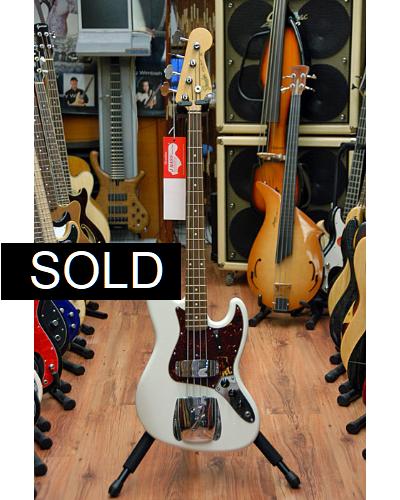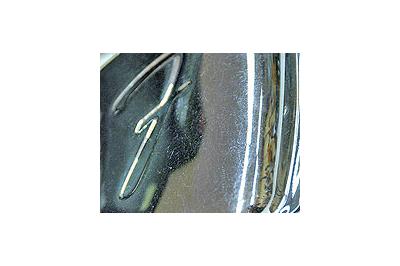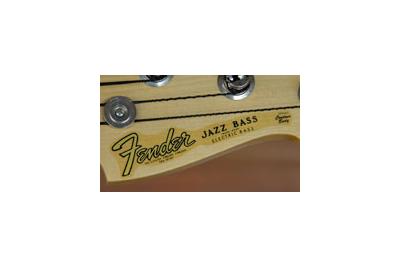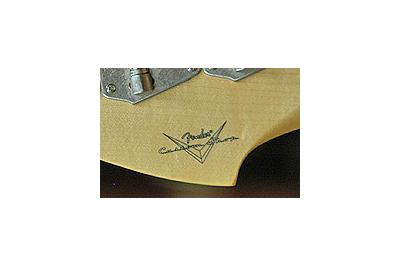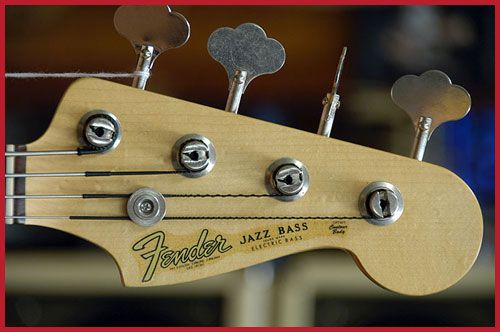
When it was released in 1691, the Fender Jazz Bass quickly became the instrument of choice for mani bassist who preferred the slimmer neck and twin pickup arrangement compared to the wider neck and single pickup Precision Bass.
What we have here is a close reprodcution of a Jazz Bass from 1964. The original model from 1961 had stacked Volume and Tone (one for each pickup), but this as later changed to the standard 2 Volume + 1 Master Tone pots, which made sound changes faster. Some players even assured that the 2 Vol/1 Tone arrangement sounded better than the stacked concept.
Being a Fender Custom Shop Bass, this bass represents the best instrument that Fender are building, so you get a bass that is built from the best selected woods. Lots of attention to detail has been paid in order to make this bass as authentic as possible. Here's a bold statement: there's no difference between this bass and the original, except you know on this one there are no issues on the neck, frets or electronics.
The medium weight alder body is finished in Olympic White and has a maple neck with a round laminate rosewood fingerboard.
The C shape neck is a bit thicker than later models from the 70's but still feels really comfortable under your hand. The nitrocellulose lacquer fisnish is also time correct, and has a nice organic feel to it.
More details that make this a perfect replica of the original are: nickel/chrome hardware, vintage reverse tuning gears, 4 ply tortoise pickguard, as well as the original accessories such as the bridge and neck pickup covers, and even a finger-rest.
The bass has been given the Closet Classic finish. This simulates the wear of an instrument that was actually bought in 1964, played a few times, and then was carefully stored in its case until today (isn't this a bass player's dream?). There are some small dings and scratches, metal parts are only slightly oxidized an the finish is mildly checked.
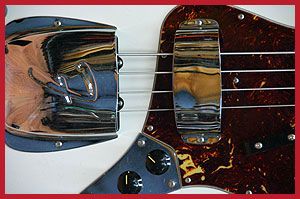
As soon as you play this bass unplgged, you are rewarded with a clear and warm response. That is of course a very good sign, so when you plug it in, that's exactly what you get too.
The bridge and pickup plates may get in the middle, but if you give it some time, you end up getting used to them. Of course you can remove one of them or both if you so prefer.
Don't expect a high power machine or a slapper's dream tone here. This bass has a nice warm, rich and fluid tone to it, which is exacty what those fantastic Jazz Basses from the 60's were all about.
When you hear a bass like this, you realize why it is a true classic instrument: it does not lack any frequency in the sonic spectrum and at the same time does dramatically boost any either, so it will sit in a mix perfectly with a lot of different instruments regardless the style of music it is used for.
Compared with the more aggresive and scooped Jazz Basses from the 70's, the 64 Jazz Bass has a warmer and rounder sound which makes it ideal for fingerstyle or pickwork. Slap techinque was not introduced until a few years later by Larry Graham, but funnily enough this bass has one of the fattest and warmest slap sounds around.
The neck pickup is probalby the closest to a split Precision pickup we've ever heard. This a tremendous bonus, as you get the sound of a good old vintage Precision sound from a Jazz Bass, which is not something usual.
The bridge pickup has the right amount of bite, and if you are a fan of Jaco (who isn't?) then you'll probably know he used Jazz Basses from the 60's, so you know what to expect from that pickup.
To sum up; one of the best Jazz Bass sounds ever, perfectly recreated, that delivers also a great Precision and Pastorius (fretted) sound. Add to that a classy looking instrument that is really comfortable to play and you get a bass that is irresistible. Even if you don't care much about the connection to the original '64 bass, this is simply a top quality bass that will last a lifetime and will give you years of enjoyement.
Note: of course, all of us would like to find an original Fender from the 60's, and get it in decent condition and for a fair price, but that is almost impossible. Prices nowadays are just prohibitive (due to collectors who are buying these basses to speculate with its value) plus there's always the chance that you buy a modified instrument, which would mean it has no value as a collector's instrument and what's worse, you won't get the real thing. That's why we like this bass so much. You are buying an instrument made with the same materials and to same specs as the original, and even feels like a 40 year old bass.



